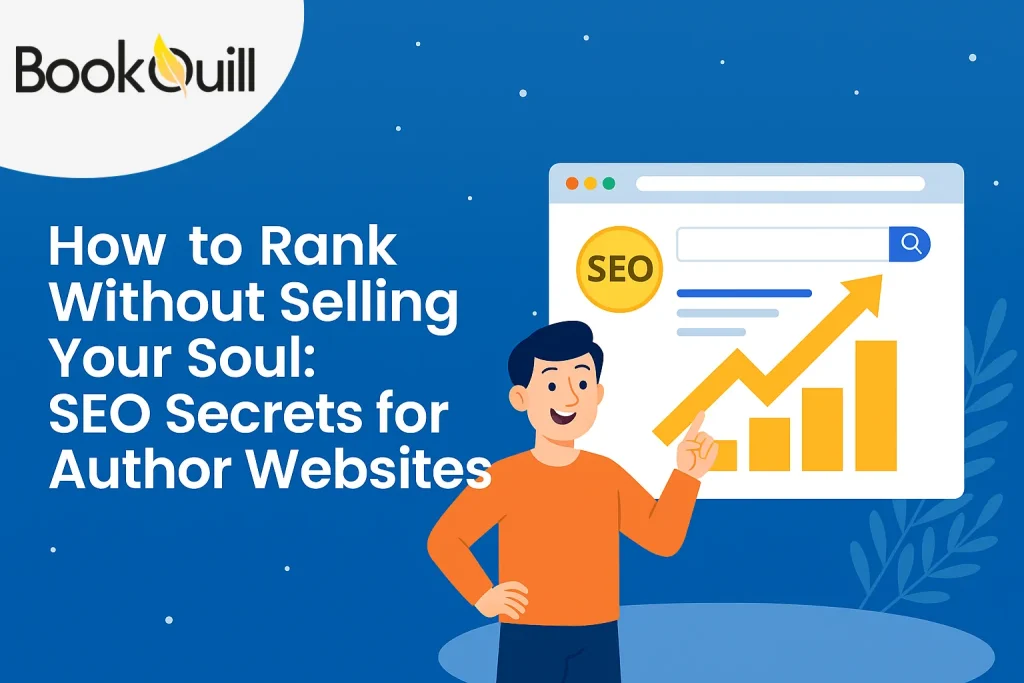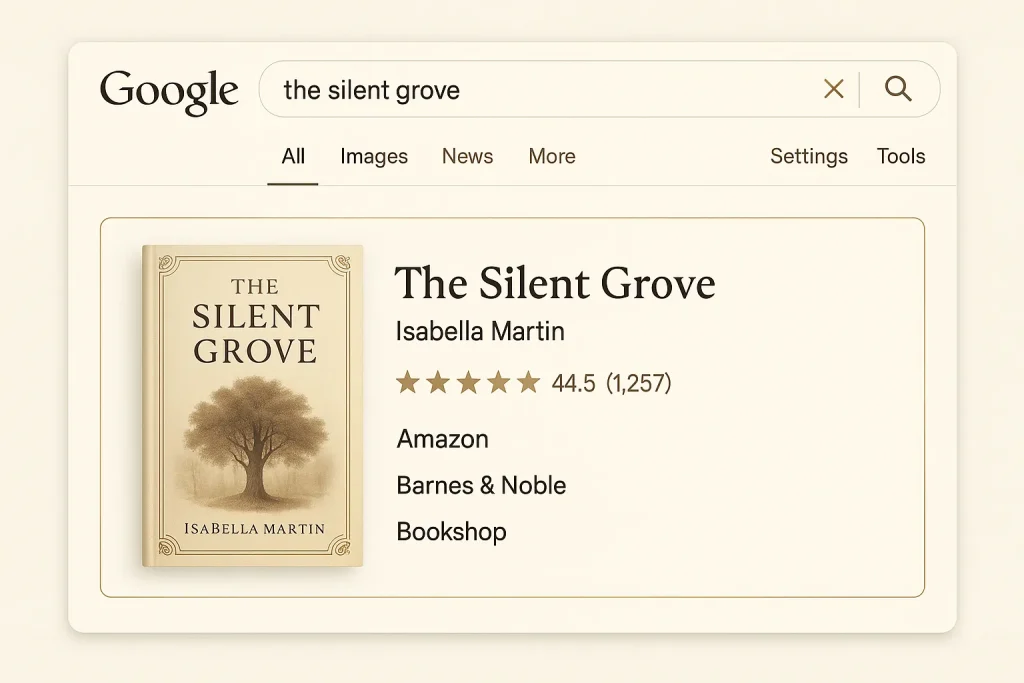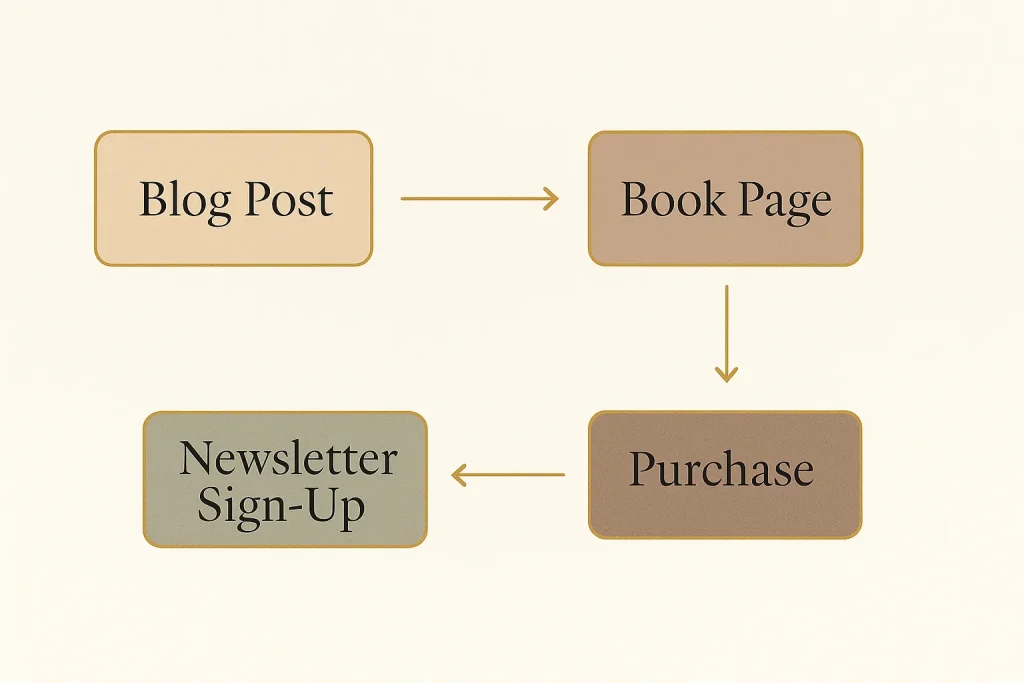Table of Contents
Explore Blogs
Trending on Ebook
How to Rank Without Selling Your Soul: SEO Secrets for Author Websites

Can you spot a certain kind of author’s website from a mile away? Yes? But how? Not because it’s memorable but because it’s, well… tragic. It’s the keyword cemetery. A website where every sentence feels like it was written by a robot and goes by, “Best fantasy book author fantasy books fantasy writer fantasy fantasy fantasy…”
This is what we call “selling your soul for SEO.” Using too many keywords for the author’s website SEO and throwing your unique voice, humor, and charm out of the window in a desperate attempt to please the search engine gods. And while yes, Google can open the gates to more readers, it’s not worth making your site look like it was copied and pasted.
But then, how can I rank my website? Well, trust me, you don’t have to choose between ranking high and staying true to your voice. You can absolutely get your author website found by real people, with real money, who really want to read your work, without throwing in too many keywords.
And that’s where we are here! In the following blog, we are going to be walking through a detailed guideline to SEO for authors, along with ethical strategies you can take that work, or if you’d rather not want to wrestle with the tech stuff yourself, there are premium author website designers who can handle it for you. Because at the end of the day, the real secret to SEO isn’t about tricking Google. It’s about helping readers find you faster. And if you do it right, they’ll land on a site that actually feels like you.
So, let’s get started!
Key Takeaways
- You can improve your website SEO without sacrificing your unique voice or turning your site into a keyword-stuffed mess.
- Consistent, reader-focused content and not constant posting are the foundations of effective SEO for authors.
- Long-tail keywords, book schema, and internal linking are powerful tools that make your website SEO work harder for you.
- Technical basics like mobile optimization, site speed, and clean URLs are essential for ranking and keeping readers engaged.
- SEO is about connection, not manipulation, so focus on authentic content and let optimization support your storytelling.
The SEO Basics Every Author Needs to Know
Let’s make one thing clear first. SEO is not some witchcraft or dark art that you need to sell your soul to practice. SEO, i.e., Search Engine Optimization, is simply the process of helping Google ‘get’ your site, the same way readers ‘get’ your writing. That’s it.
In the context of SEO for authors, it means making sure that:
- Readers can find you when they’re looking for books like yours.
- Your site answers their questions before they even know they had them.
- Google understands what your site is about and can put you in front of the right audience.
It’s like a bookstore experience. If you wrote a crime thriller but placed it in the “Self-Help” section, your readers won’t be able to get to you. SEO is the digital equivalent of putting your book in the right aisle, on the right shelf.

Good SEO vs. Manipulative SEO
Now, when we are discussing SEO, let’s also discuss what good and bad SEO are and where most of the authors lose their way.
Good SEO: Making your site genuinely useful, engaging, and easy to navigate for readers and search engines. It says, “I know who my readers are, I know what they’re looking for, and I’m going to create content they’ll actually enjoy.”
Manipulative SEO: Stuffing your pages with so many keywords or buying spam backlinks from shady sites. It says, “I heard if I repeat the book website SEO 87 times, Google will make me famous.”

Why It Matters for Author Websites
A website for authors matters most to them. Why? Because a website is their personal bookstore consisting of only their titles, a press kit for media, a newsletter funnel for building their fan base, and a community hub where readers come back for more.
Without an author website SEO, your site is like a novel sitting unpublished. Full of potential, but invisible to the people who would love it most.
However, when you do your own search engine optimization well or get help from professionals who actually understand writers, you don’t just get traffic. You get the right traffic:
- People searching for your genre.
- Readers looking for the kind of stories you tell.
- Bloggers, podcasters, and reviewers who want to feature you.
And when that happens, your site stops being a stationary online placeholder and becomes a living asset that helps you sell books, grow your audience, and maybe even land your next publishing deal.
Why Author Websites Fail to Rank
If your SEO for your author website feels like it’s going nowhere, it’s probably not because Google “has it out for you” or because you’re “too niche.” It’s usually because of one or several fixable mistakes.
1. Not Enough Relevant Content
Remember, a beautiful site with nothing but a bio, one book page, and a contact form is like a bookstore with one lonely shelf.
Google loves content. Readers love content. If you only update your site once every two years when a new book launches, you’re starving both.
What to do instead:
- Create blog posts that explore your book’s themes, your genre, or your creative process.
- Share deleted scenes, or “what I learned while writing” posts.
Make each piece of content something readers want to stumble across while searching. This is the backbone of a book website SEO.
2. Treating Your Site Like a Business Card
A lot of authors think, “I have a website. Job done.” But if your site hasn’t changed in the last 3 to 5 years, it’s not doing you any favors. Search engines reward freshness, and readers notice when your “Upcoming Events” page still lists a 2018 book signing.
Make your website a place that’s always evolving with your career. Add interviews, event recaps, fan Q&As, new photos, and even the occasional personal essay.
3. Writing Only About Yourself
Yes, you are fascinating. Yes, your cat is adorable. But if your website is 90% “me, me, me,” you’re missing the point of SEO for authors, and that is to connect with what your readers are searching for.
Ask yourself:
- If someone who’s never heard of me lands here, will they find something valuable?
- Would they stick around if they weren’t already a fan?
If the answer is “probably not,” it’s time to broaden your content beyond your bio.
4. Ignoring Mobile Optimization and Speed
Did you know that more than 60% of searches happen on mobile devices? If your site takes forever to load or looks like a 2004 forum post on a phone, you’re in trouble. Google openly admits that slow and clunky sites get pushed down in rankings.
This is where affordable website designers for authors who understand responsive design can save you hours of hair-pulling. Fast and mobile-friendly sites don’t just rank better, they keep readers from rage-quitting your page before it loads.
However, the truth is, most authors don’t fail to rank because they’re bad writers. They fail because they treat their website like an afterthought instead of the powerful marketing tool it is.
And that’s where the Soulful SEO Approach comes in, making your site a reader magnet without sacrificing your personality or creative integrity.
The “Soulful” SEO Approach
If the phrase search engine optimization makes you picture bland blog posts stuffed with keywords, I have some good news for you: that’s not the only way.
The soulful approach to author website SEO is all about ranking high without becoming unrecognizable in your own space. It’s where your personality, your stories, and your readers’ curiosity lead the way, and Google follows along happily.
1. Write With Reader Intent in Mind
Google doesn’t just care about keywords. It cares about whether the searcher gets what they came for. So if someone searches for “best cozy mystery books with a female detective,” and your blog post is genuinely helpful and offers your books listing, sharing insights, even mentioning your own, you’ve just made both Google and the reader happy.
When you know your readers’ questions, struggles, and wants, you can create content that answers them naturally. That’s SEO for authors in its purest and best form.
2. Use Keywords as Seasoning
Yes, keywords matter! They’re how Google connects your site to a search query. But keyword stuffing is like dumping an entire salt shaker into your soup. One spoonful and the reader’s gone.
Instead:
- Pick a main keyword for each page (like “seo for author website”).
- Use it naturally where it fits. Maybe in titles, subheadings, image descriptions, and the body text.
- Let your writing carry the flow, not the keyword count.
3. Tell Stories in Meta Descriptions
The Meta description (that little snippet under your page title in search results) is your first chance to hook a reader. Most people write them like boring summaries. Please don’t!
Instead of:
“Learn SEO tips for authors and improve your rankings.”
Try:
“Want readers to find your books without turning your site into a keyword graveyard? These author SEO secrets will make Google and your fans happy.”
It’s still an SEO-friendly book website, but it’s also intriguing and human.
4. Structure for Skimmers and Deep Readers
Some visitors will binge every word, while others will skim like they’re speed-reading. To keep both happy:
Use headings to guide the eye.
Keep paragraphs short enough to breathe.
Highlight key ideas so skimmers can get the idea and then feel compelled to slow down.
A well-structured post tells Google your page is easy to digest, and it tells readers, “You’re welcome here, no matter your reading style.”
And remember, this approach isn’t about playing the system. It’s about aligning your site with the way people actually search and read. When you do this, you are not chasing the algorithm, but you are building a digital site where both Google and your ideal readers feel comfortable.
And now that we’ve got the philosophy down, it’s time to get practical.
SEO Secrets for Author Websites (The Good Kind)
Most articles about SEO tell you the same tired advice, i.e., to “Use keywords! Write good content! Build backlinks!” Great. Thanks. That’s like telling a writer, “Use words!”
The truth is, book website SEO is a little different from regular business SEO, because you’re not selling shoes or blenders. You’re selling stories, and the way readers discover those is unique.
Here’s how to work that to your advantage.
1. Embrace Long-Tail Keywords
Instead of fighting for high-volume and highly competitive keywords like “romance books” or “fantasy novels”, go after specific and intent-rich phrases:
- “Best historical romance novels set in Victorian England”
- “YA fantasy books with strong female protagonists”
- “How to do your own search engine optimization for a poetry website”

These long-tail keywords have lower competition, higher conversion, and they often bring in readers who are ready to buy.
2. Use Book & Author Schema Markup
A schema is like giving Google a cheat sheet about your content. It’s a bit of code that tells search engines, “This is a book. This is the author. Here’s the ISBN. Here’s where to buy it.”
With schema, you can get rich snippets in search results. Those eye-catching boxes with ratings, cover images, and purchase links.

Even if you’re not tech-savvy, you can hire an author website design service that can set this up for you. It’s one of those “do it once, benefit forever” upgrades.
3. Turn Book Excerpts into Traffic Magnets
Posting a free chapter is a nice teaser, and if your excerpt includes naturally occurring keywords (character names, locations, unique concepts), it becomes searchable content.
Here’s a tip! Pair the excerpt with a blog post about the writing process, the research behind the scenes, or the inspiration for it.
4. Internal Linking Is Your Invisible Sales Funnel
Your site’s pages should talk to each other.
- Blog posts about writing your mystery novel? Link it to the sales page for that book.
- About page? Link to your newsletter signup.
- Book page? Link to interviews or reviews.

Internal linking tells Google your site is a connected and authoritative source and tells your reader exactly where to go next.
The Content Plan That Actually Works
Here’s the content plan that works! Because knowing the tactics is one thing, but aligning them into a consistent and sustainable content strategy is how you actually win.
However, one of the biggest misconceptions about author website SEO is that you need to write blog posts every day, spend three hours in Google Analytics before breakfast, and work as a marketing intern.
You don’t!
What you do need is a plan for creating content that works for both Google and your readers.
1. The Golden Rule: Write for People First, Optimize for Google Second
If your content reads like a robot has written it, your reader will bounce before you can say “buy my book.” But if you focus on creating articles, pages, and updates that readers genuinely enjoy, then add in your keywords, you’ll start to see the pull.
2. Content Authors Should Publish
Blog Posts on Genre-Related Topics
Example: If you write crime thrillers, a post like “5 Real-Life Heists That Could Inspire Your Next Thriller” is click-worthy and naturally packed with keywords.
Also, you can sneak in mentions of your own books without it feeling like a sales pitch.
Behind-the-Scenes of Book Creation
Readers are nosy (in the best way). They love hearing how your characters were born, the research you did, and the disasters you avoided.
This kind of storytelling keeps visitors coming back, and yes, it’s great for book website SEO.
Lists, Interviews, or Research Deep Dives
Lists are shareable and digestible. Also, interviews with other authors or experts in your niche help you tap into their audiences.
SEO-Friendly Book Landing Pages
Each book deserves its own optimized page. Remember to use long-tail keywords, excerpts, reviews, and buy links.
3. The Power of a Content Calendar
You don’t need to post daily, but you do need to post consistently. A blog post every two weeks or one strong monthly update is enough to keep your site fresh in Google’s eyes.

Here’s a tip! Plan 3–4 months ahead. That way, if life gets chaotic, you’re not scrambling to publish something last-minute.
4. Repurpose Like a Pro
One blog post can become:
- A newsletter segment
- Social media posts
- A video for YouTube or TikTok
- A downloadable PDF for readers
This means you’re not creating from scratch every time, but you’re still giving Google (and your fans) new reasons to find and follow you.
Backlink Building
Backlinks, links from other websites to yours, are like literary authorizations in the eyes of Google. The more quality sites that link to you, the more search engines think, “This author must be worth paying attention to.”
However, you need to remember that not all backlinks work the same. A link from a respected literary blog or an online magazine is worth infinitely more.

Here’s how to build them the soulful way.
1. Guest Posting on Genre Blogs
This is the digital equivalent of being invited to write a guest essay in a well-known magazine.
- Identify blogs your ideal readers follow.
- Pitch them a thoughtful and valuable article.
- Include a short bio with a link to your site.
If all is done right, you will get exposure to a new audience and a quality backlink for your book website SEO.
2. Collaborations with Other Authors
Team up for:
- Joint blog posts
- Anthology projects
- Virtual events or webinars
You each link to the other’s site, boosting your credibility and expanding your reach. This is especially useful for authors on a budget looking for professionals to stretch their marketing efforts further.
3. Get Listed on Book Review Sites and Literary Directories
Many genre-specific directories exist only to connect readers with authors.
Some are free, some are paid, but if they have a good reputation, they can give your website a significant boost.
4. Appear on Podcasts
Podcasts are a goldmine for backlinks and exposure.
- Search for podcasts that focus on your genre or writing in general.
- Pitch a topic you can speak passionately about.
Most podcast hosts include a link to your site in the show notes, which is another great way to boost your website.
The Future of SEO for Authors
If you think SEO is something you can learn once and be done with, I have bad news for you: the internet moves faster than a thriller plot twist.
Google updates, new technology, and shifting reader habits mean what works today may look old-fashioned in just a year or two.
However, authors are already storytellers, and staying relevant in SEO is really just about telling your story in ways that match how people are searching.
1. Voice Search Is Changing the Game
With smart speakers, voice assistants, and phone-based voice search, people are searching in full sentences now and not just “fantasy books,” but “What’s a good fantasy book series with dragons and a strong female lead?”

This means your book website SEO strategy should include conversational, question-based phrases in your content. Like FAQ pages, blog posts that answer specific reader questions, and headings phrased like your audience would actually speak.
2. AI Search Assistants
AI-driven search is starting to deliver summarized answers instead of just listing websites.
To stay visible in this environment:
- Provide clear, authoritative answers in your content.
- Format some sections in a way that’s easy for AI to pull.
- Still keep your personality intact and use engaging text to get clicked.
3. Social Signals & Discoverability
While Google says social media isn’t a direct ranking factor, it’s a powerful indirect one. A blog post that gets shared widely sends signals of relevance and can lead to backlinks, which do improve rankings.
- Share your content strategically on platforms your readers actually use.
- Collaborate with other authors to cross-promote posts.
- Use visuals to make your content more shareable.
4. Evolving Reader Behavior
Younger readers, especially, are searching more on TikTok, Instagram, and niche communities before heading to Google.
The smartest authors will use their website as the home base while letting social media act as the front door. Every path, from social post to Google search, should lead back to your site.
Remember, the future of SEO for an author’s website strategy isn’t about chasing every trend. It’s about knowing where your readers are headed and making sure your site is ready to welcome them when they arrive, whether they type, tap, or talk their way there.
Conclusion
If you’ve made it this far, congratulations, you now know more about SEO for authors than most people. And remember, you don’t need to turn your author website into a soulless keyword cemetery to show up in search engines. You can just climb the rankings while keeping your personality intact, your writing style sharp, and your readers engaged through the strategies we have mentioned.
In the end, the author’s website SEO isn’t about tricking Google. It’s about making it effortless for the right readers to find you, fall in love with your words, and stick around for the next chapter.
And if the thought of doing all this still makes you want to hide under your desk? That’s okay too. You don’t have to figure it out alone, this is exactly what we help authors with every day.
Whether you’re just getting started and need affordable author website design services to overhaul your site into a ranking powerhouse, we can make it happen.
From optimizing your website SEO to building a site that reflects your unique voice, we help you get found by the readers who will love your work the most.
Contact us today to get started.
Frequently Asked Questions
What is the author’s website SEO, and why does it matter?
It’s the process of making your author site easier for search engines and readers to find, helping you grow your audience and sell more books.
What’s the biggest mistake authors make with SEO?
Focusing on keywords over reader experience makes the site feel impersonal and less engaging.
How do you do your own search engine optimization as an author?
Start by researching long-tail keywords relevant to your genre, optimizing your site’s titles and Meta descriptions, creating regular reader-focused content, and building backlinks through collaborations or guest posts.
Is it better to hire affordable website designers for authors or do it yourself?
If you have time and some tech skills, you can handle the basics yourself, but hiring a designer can save time, ensure professional quality, and set up your site for long-term SEO success.
How do I choose the right author website designers online?
Look for designers with experience creating author-specific sites, strong SEO knowledge, portfolio examples, and positive reviews from other writers.
About Author
Hi, my name is Zachary Stone I’m a book marketing nut — or, as I like to call myself, a “Shelf Marketer.” No, I don’t sell wooden shelves; I market the books that are left forgotten on them. If you want your book to be the next bestseller, I am your go-to person. I am here to remind you that it’s not just about writing a great story — it’s about building a buzz among people with great campaigns.




